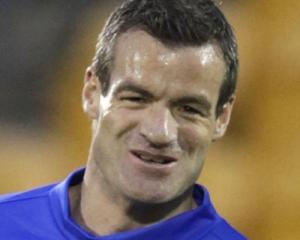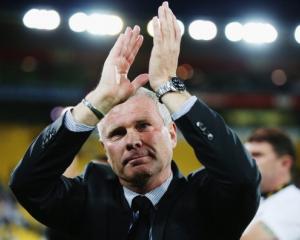• Progress might come down to luck
Harangued by the Italian press after the shock draw with the All Whites, he kept suggesting that his side had played into the hands of opponents who were "two metres tall".
Yes, Rory Fallon - who battered the Italian defenders - is a big lad.
But at 1.9m, he and Chris Wood are the tallest of the All Whites.
Never mind, though, because these All Whites have sprung up to become larger-than-life figures.
They have grown an arm and a leg, in their international football status, and the public's heart and mind.
They were a disparate mob to begin with, from all walks of football life.
They talked confidently, and had a few results to back it up, but few expected them to give the World Cup the sort of shake that they have.
From the injury-plagued world of goalkeeping hero Mark Paston, to the glittering career of Ryan Nelsen, and all points in between, they have turned out to be a remarkable bunch.
I'm not all that fussed on comparing sporting achievements.
The business of ranking Peter Snell's Olympic medals against John Walker's gold, or winning the first rugby World Cup, or our various aquatic achievements, and so on and so forth, has always seemed unnecessary, and even crass.
But for romantic sporting adventures, the only one to compare with this short, sharp shock was the 1982 All Whites' campaign which took that team to the World Cup finals in Spain.
The surprise element sets the two football journeys apart from the rest.
Many of the current players have persevered through the tough times of professional sport, battling for contracts and game time.
They include the veteran Simon Elliott, one of the stars, who at 36, is still without a club having been cruelly cut just before the new American season began.
Others such as Leo Bertos have finally found a home, in his case at the Wellington Phoenix, after fruitless years trialling for English clubs, sleeping on floors - including Rory Fallon's - and wondering if professional football was the life for him.
Ivan Vicelich, another veteran, had retired from international football before answering coach Ricki Herbert's distress call when Ryan Nelsen was injured before last year's Confederations Cup.
The stories go on and on, from the Auckland-born Winston Reid being snared from Denmark, where he has lived for half of his young life, following an inquiry from TV3, to the England-raised Tommy Smith declaring for New Zealand, where he learnt his football.
But the central figure, without a shadow of a doubt, is captain Nelsen.
His ability alone in the heart of the defence keeps New Zealand in games, but his presence, the respect he draws, is the factor that makes the whole shebang work.
Insiders say that what Nelsen wants, he gets, but that he is always acting in the best interests of the team, and is no prima donna.
As a result, there are no cliques.
Nelsen is clearly a smart man, but also has an uncomplicated handle on life.
The magnitude of his achievement in captaining an English premier side is probably overlooked in New Zealand, although perhaps no longer.
And you can see the commitment to the Kiwi cause before games, etched on his face, and in the way he stamps a hand over his heart.
I wrote before the team headed to South Africa that he is the most significant player in the history of the All Whites, and I am doubly sure of that now.
The game has a chance, in its limited way, to rewrite history, to turn a corner, to find a new place in New Zealand life.
And this is largely down to one man.
Wynton Rufer may be regarded as the best player we have ever produced but no-one has had a greater effect on the national side and, given recent events, the potential future of the game.
Those two World Cup draws, those two group points, have been hard earned.
This week's wonderful afternoon in Nelspruit, when the All Whites drew with Italy, was not only a moment for wild celebration.
It was also a nod to the game's fighting spirit and survival instincts in New Zealand.
Football has not always been kind to itself.
Yet in clubrooms and on fields around the land, it has persevered in its own way because people from so many walks of life, and races, love this game.
Who knows if this World Cup will see a definitive rebirth? But with Fifa millions in the bank, and interest at an incredible high, football has a golden chance.
And finally, it had a truly golden day, in a far-off land, at a place so remote that the specially built World Cup stadium at Nelspruit may turn into a white elephant after the tournament.
Whatever happens to the Mbombela Stadium, the name Nelspruit will live on in New Zealand sporting lore, the place where the crazy past came together perfectly on a wonderful day.











